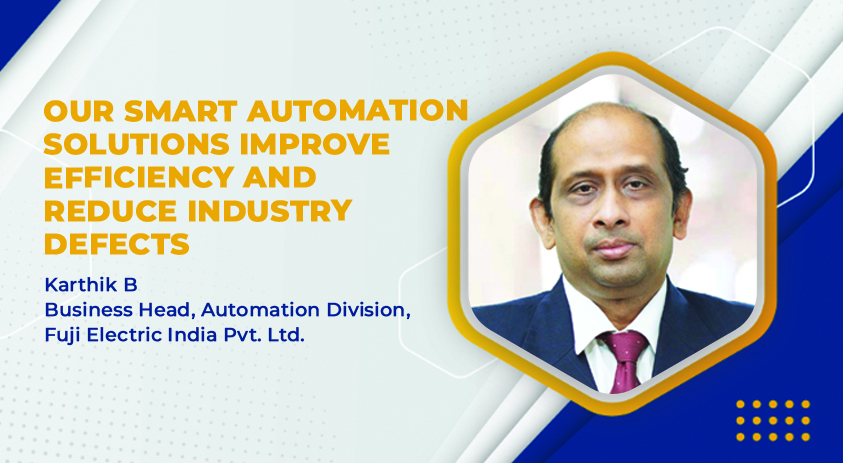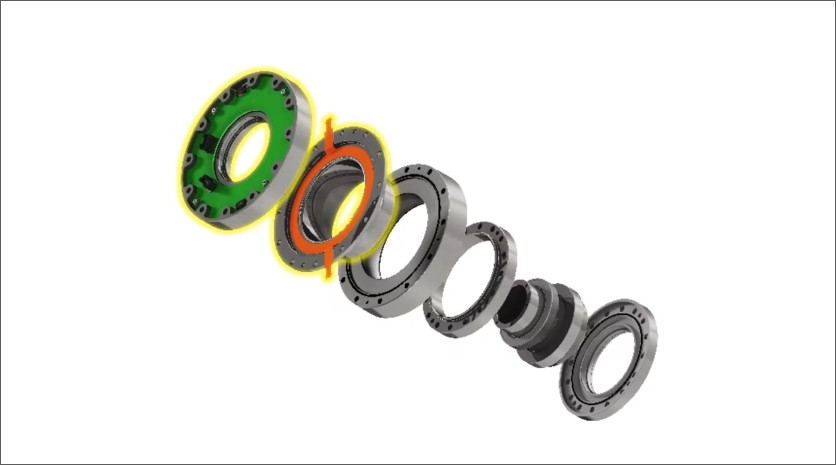Our smart automation solutions improve efficiency and reduce industry defects
By OEM Update Editorial July 31, 2023 2:30 pm IST
According to B. Karthik, smart automation is involved in every aspect, from design to machine monitoring. It aids in visualising project constraints, predicting potential machine failures, and optimising production processes.
How do Fuji Electric’s smart automation solutions contribute to reducing industry defects and improving production efficiencies for diverse industries?
Fuji Electric India boasts a rich legacy of over a century in the global power electronics business. Our expertise has assisted diverse industries such as Steel, F&B, Printing & Packaging, Textile, Heavy industry, Sugar, and Plastic with cutting-edge automation solutions, enhancing their efficiency and reliability.
With manufacturing facilities in Chennai and Pune and R&D centres, we are well-equipped to understand and address our customers’ unique challenges with tailored solutions. Having served our customers for thirty-five years, we remain dedicated to fortifying our operations in India, upholding sustainable business practices, and delivering top-quality products and automation solutions to various factories and manufacturers.
At Fuji Electric, we strive to innovate and confront complex challenges with the experience of our 100-year history, empowering customers with state-of-the-art automation solutions. Smart automation, as we envision it, involves machines capable of making efficient decisions by comprehending workflows and utilising available data knowledge. This approach leads to improved control systems that understand the environment and act autonomously, reducing industry defects.
Businesses enjoy ‘liberation of sorts’ after incorporating smart automation. It allows them to focus on other aspects and thereby enhancing production efficiencies. This, in turn, enables companies to drive change, strengthen their market position, and scale their operations effectively. Most importantly, it allows the delivery of cutting-edge services to customers, solidifying their satisfaction.
What are the key benefits and challenges faced by Indian manufacturing companies in adopting Industry 4.0 and smart manufacturing technologies?
Indian manufacturing companies have been rapidly embracing automation, a phenomenon known as Industry 4.0. This widespread adoption of smart manufacturing technology transforms the manufacturing sector’s operations. With the integration of automation, machine learning, and the Industrial Internet of Things (IIoT), manufacturing companies are entering a digitally advanced era.
Implementing these smart manufacturing technologies plays a crucial role in reshaping traditional manufacturing practices, boosting productivity, and contributing to the country’s goal of becoming a global manufacturing hub. To remain competitive and meet customer expectations, businesses recognise the importance of being digitally advanced and are under pressure to deliver value in the market.
How does adopting Smart Automation and Industry 4.0 technologies in manufacturing impact productivity, cost reduction, and overall operational efficiency?
The manufacturing sector is undergoing a significant transformation after the Covid pandemic. This shift is marked by a transition from manual labour to automation, giving rise to the term “Smart Automation.” In response to evolving demands, large-scale manufacturing operations increasingly adopt smart automation to reduce repetitive tasks and minimise human intervention. Industrial automation has become crucial to meet current requirements, as traditional manufacturing methods are no longer adequate. Favourable government policies are also driving the demand for smart automation.
The growth of Smart Automation can be attributed to the rapid adoption of enabling technologies in manufacturing, the integration of connected supply chains, and mass production to meet the rising demand. Implementing Industry 4.0 principles and government initiatives promoting industrial automation in various sectors have also fuelled this trend.
In the manufacturing industry, Smart Automation utilises intelligent machines to execute manufacturing processes more efficiently, effectively, and precisely. This technological shift is driving improvements in manufacturing processes, enhancing productivity, and meeting the demands of a dynamic market.A few of the Smart automation technologies used in the manufacturing industry are –
- Industry 4.0
- The Industrial Internet of Things
- Artificial Intelligence
- Big Data
- The Cloud
- Cybersecurity
- Advanced Materials And Additive Manufacturing
- Modelling, Simulation, Visualisation, and Immersion.
Right from design to machine monitoring, smart automation plays a role. It helps to visualise the project’s limits, anticipate a possible machine failure and optimise the production process. Not just that, but its impact is felt in development and maintenance. Importantly, it leads to cost reduction for companies.
How do AI-powered algorithms enhance efficiency in manufacturing by detecting defects more accurately and quickly?
AI-powered algorithms offer substantial benefits, notably by diminishing errors and enhancing accuracy and precision. These advantages stem from AI’s reliance on prior data and specific algorithms for decision-making, which, when appropriately programmed, can eliminate errors. The perks of AI-powered algorithms encompass risk-free operations, 24/7 availability, impartial decision-making, and accelerated processing.
How does smart automation play a crucial role in improving production efficiencies?
Fuji Electric India is renowned for its intelligent, scalable, innovative factory and process automation solutions. These products integrate top-notch equipment, advanced engineering services, optimal control technologies, and IoT advancements. Fuji Electric offers a range of automation solutions, including Micrex DCS, SCADA, and SPF&SPH.
With favourable factors in our favour, Fuji Electric aims to expand its market share in the automation sector. It anticipates a remarkable growth rate of over 20% in the next five years. The increasing demand for our solutions is evident from our extensive Pan India service network, comprising over 400 trained service engineers in 80+ locations and 18+ sales centres.
To further support this growth, we have invested Rs 150 crore in establishing a state-of-the-art manufacturing plant in India. This strategic move will enable us to manufacture automation products locally, meet customer demands effectively, and work towards achieving our target of becoming a 1500 crore company by the end of 2023. Indian customers can expect high-quality, locally manufactured products infused with cutting-edge Japanese technologies.
What ethical considerations are associated with the widespread adoption of smart automation in various industries?
Despite the benefits of smart automation, it comes with its fair share of challenges. Implementing such systems demands significant time, resources, and substantial financial investment due to the need for the latest hardware and software updates. The absence of human involvement hinders creativity, and the integration of ethics and morality into AI remains a concern. Additionally, there are apprehensions about potential job losses and over-reliance on automation, leading to higher costs for advancements in this field.
Cookie Consent
We use cookies to personalize your experience. By continuing to visit this website you agree to our Terms & Conditions, Privacy Policy and Cookie Policy.








